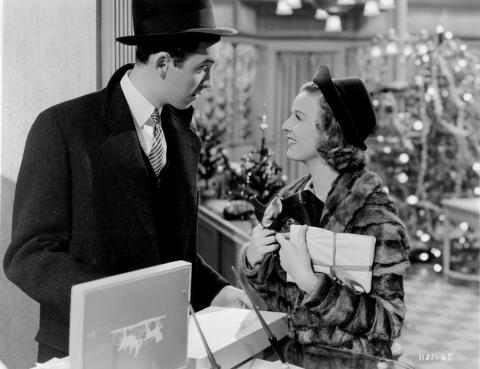Matt Connolly on THE SHOP AROUND THE CORNER

This essay on Ernst Lubitsch's The Shop Around the Cornere was written by Matt Connolly, Ph.D. candidate in UW Madison Dept. of Communication Arts. Shop will screen as the final Sunday Cinematheque at the Chazen, in the Chazen Museum of Art, on Sunday, December 13 at 2 p.m. Due to circumstances beyond our control, we are not able to screen the film on 35mm as originally announced. A DVD will be shown in its place.
By Matt Connolly
Writing in Film Comment on the striking paucity of films dealing with the workplace as a concrete reality of everyday life, Kent Jones notes at least one movie that honors the daily grind with neither an overreliance on cynicism nor an overdose of sentimentality. “What separates The Shop Around the Corner from almost every other work-centered movie is its honesty,” says Jones of Ernst Lubitsch’s 1940 romantic comedy, adding that it’s “known for its ingenious and delicate romantic entanglements, but it would be nothing without this frank acknowledgment of human fallibility in the workplace, unencumbered by moral hierarchies.”
Jones is one of our very finest critics, and there’s little I can say in response to his broader analysis of The Shop Around the Corner’s nuanced portrait of retail labor besides an enthusiastic nod of the head. I can only add that the film’s great strength and singularity lies in how effortlessly it links the aforementioned “ingenious and delicate romantic entanglements” of its protagonists with the workplace in which they squabble, negotiate, and finally connect with one another. Few films so strikingly underscore the barriers we attempt to place between our work and our private lives, only to reveal (with great wit and insight) how inevitably fuzzy that line really is.
In true romantic comedy fashion, the eventual couple at the center of The Shop Around the Corner meet cute. Unbeknownst to them for much of the movie, they actually do it twice. Alfred Kralik (James Stewart), the top salesman at leather goods shop Matuschek and Company, has answered a newspaper personals ad placed by a fellow Budapest resident. He delights in their written exchanges on literature, culture, and ideas, and hopes that it will develop into a real-life romance. Around the same time, he meets Klara Novak (Margaret Sullivan), who comes to Matuschek and Company seeking a job and who is soon hired after selling a particularly undesirable cigarette box to a fellow customer. (The cigarette box plays a grating rendition of “Ochi Chërnye” whenever it’s opened, but Klara reframes the item as a candy box whose tune reminds one to watch their consumption of sweets.) Alfred and Klara quickly grate on one another at work, while both privately continue a rewarding written back-and-forth with their respective pen pals. (Klara has also found a smart and charming companion via the newspaper.)
Needless to say, Alfred and Klara are one another’s mystery correspondents—a charming contrivance in and of itself, but one that takes on evermore humorous and poignant dimensions as the film progresses. Alfred eventually discovers that Klara is the woman on the other end of the letters, keeping the revelation under wraps as he attempts to pursue her in person. Klara rebuffs these tentative advances by drawing withering contrasts between Alfred and the man with whom she’s been writing to. In a stinging rebuke, she dismisses Alfred as “a little insignificant clerk.” The moment lands with particular impact as it succinctly underscores how inconceivable it is to Klara that the poetic, intellectually engaged man with whom she’s been falling for might also occupy the same quotidian workplace as herself. (In fairness, Alfred feels much the same way about Klara before discovering her true identity.) Both Klara and Alfred so strive to distance themselves from the commonplace nature of their job that they’re largely blind to the fellow dreamer right beside them.
So much of The Shop Around the Corner rests upon a knowing—and knowingly empathetic—conception of how work fosters relationships at once tender and uneasy. It’s one of the film’s great unspoken jokes that, though we hear snippets of their poetry-laden letters to one another, it is Alfred and Klara’s snappish workplace repartee that let us know how truly aligned they are in intellect and emotional temperament. Their relationship exists within a wider network of friendships, alliances, and affinities throughout the staff of Matuschek and Company. And while at least one of these is revealed to be built on deception, most exude a kind of ambivalent warmth, illuminating the singular blend of affection and proximity that defines so many workplace bonds. The complex rapport between Alfred and shop owner Hugo Matuschek (Frank Morgan) particularly exemplifies this, with Hugo looking upon Alfred as variously a mentee, subordinate, romantic rival, and surrogate son.
The Shop Around the Corner fittingly concludes on Christmas Eve, a traditional time to gather with loved ones that’s also a typical financial windfall for retail stores. The delicate imbrication of professional and personal intimacies that the film charts so well find their logical conclusion in these last moments: the triumph of teamwork; the bonds of time and labor; the gradual dissipation of the group as each one says their goodnights and heads home to spouses and children, or parents, or friends, or an empty house or apartment. We are finally left with our two would-be lovers, chatting as they close up shop for the hundredth (or thousandth) time. It’s just another day of work—a prospect within which The Shop Around the Corner finds both the most prosaic of pleasures and the most precious of possibilities.
